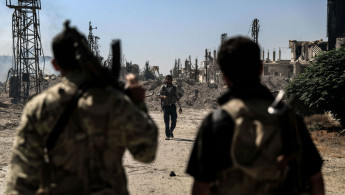Syria suicide bombing 'kills 23 Jaish al-Islam fighters' near Jordan border
A suicide bombing in southern Syria near Jordan's border killed more than 23 rebel fighters and injured dozens more on Friday, a monitoring group said.
The bomber detonated an explosive belt at a base used by Jaish al-Islam near the Nasib border crossing, the Syrian Observatory for Human Rights said.
"Most of the 23 rebels killed were from Jaish al-Islam. Dozens were wounded, including 20 in critical condition," said Observatory head Rami Abdel Rahman.
No group has claimed responsibility for the attack, but militants linked to the Islamic State group have attacked rebels in southern Syria.
A video seen by Reuters, which could not be independently verified, claimed to show at least a dozen seriously injured people on a carpeted floor.
Jaish al-Islam, backed by Saudi Arabia, is a major rebel group in the conflict and has long dominated the Damascus suburb of Eastern Ghouta.
The Nasib border crossing lies in Syria's southern Daraa province and was captured by rebel groups in April 2015.
The nearby town of Nasib is part of four so-called "de-escalation zones" agreed to in May between Russia, Turkey and Iran at peace talks in Kazakhstan.
The zones have seen thousands of civilians leave their homes across the country after the Syrian regime recaptured former opposition neighbourhoods.
The Syrian conflict began when the Baath regime, in power since 1963 and led by President Bashar al-Assad, responded with military force to peaceful protests demanding democratic reforms during the Arab Spring wave of uprisings, triggering an armed rebellion fuelled by mass defections from the Syrian army.
The brutal tactics pursued mainly by the regime, which have included the use of chemical weapons, sieges, mass executions and torture against civilians have led to war crimes investigations.





 Follow the Middle East's top stories in English at The New Arab on Google News
Follow the Middle East's top stories in English at The New Arab on Google News


